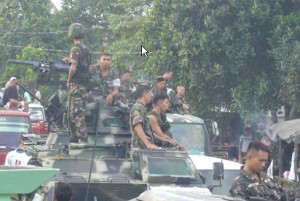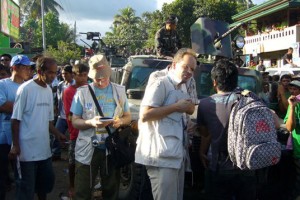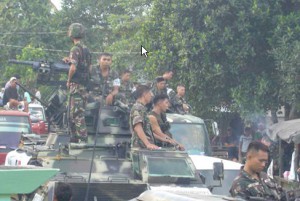By PAULINE DYCOCO and JONALYN FORTUNO
 WITH the elections over, poll groups are now bracing themselves for a slew of poll-related complaints to be filed before the courts.
WITH the elections over, poll groups are now bracing themselves for a slew of poll-related complaints to be filed before the courts.
The Legal Network for Truthful Elections (Lente) and the Citizens’ Coalition for ARMM Electoral Reforms (CCARE) are calling on witnesses to come forward and file anonymous complaints before the Commission on Elections (Comelec), a quasi-judicial body.
“We will run after the cheats, and we need (the public’s) help,” Rona Caritos of Lente said during a press conference held in Quezon City last Friday.
Lente and CCARE will for the first time test legal provisions for election-related anonymous complaints to be filed before Comelec or the appropriate court. Doing so will protect complainants from harassment and retribution, they said.
According to CCARE Chairperson Ibrahim Salic, witnesses from ARMM might not come forward for fear of their safety.
Filing such cases can be harmful to perpetrators. Poll violations include vote buying and selling; threat, intimidation, and use of fraudulent devices; coercion of election officials and employees; and possession of firearms.
Cases can also be filed against the appointment of ineligible members of the board of election inspectors (BEIs); the transfer of officers and employees in the civil service; and the use of public funds for an election campaign.
In Lanao del Sur, for instance, several BEIs received threats and as a result did not go to the precincts. In Tugaya, two civilians and a soldier were killed.
Moreover, Comelec had to declare failure of elections in at least nine of 37 towns because of Precinct Count Optical Scan (PCOS) machines that failed and ballots that were not delivered.
The delay of transmission of votes to the municipal and provincial canvassing centers also exposed poll officers and the automation system to “external risks,” CCARE said. Some of the Smartmatic technicians were also reportedly under the employ of certain candidates.
Some towns in Maguindanao and Sultan Kudarat also yielded a voter turnout of 99.9 percent, a highly unlikely figure given that in most precincts, there were no more voters by 2 p.m.
BEIs were also seen collecting ballots and feeding them into the machine and no secrecy folders were available.
Meanwhile, vote buying was observed to be “more visible” especially in Lanao Del Sur, Sulu, Basilan and Tawi-Tawi.
“Automation is not the solution, vote buying and other election-related concerns remain,” said Ibrahim.
Int’l group’s findings
 Foreign members of the International Observers Mission (IOM), a group of poll experts from five countries, agreed that numerous election rules, procedures and protocols have not been observed and enforced. These happened not only in areas like Maguindanao, but also in Negros Occidental, Pampanga, and Pasig City.
Foreign members of the International Observers Mission (IOM), a group of poll experts from five countries, agreed that numerous election rules, procedures and protocols have not been observed and enforced. These happened not only in areas like Maguindanao, but also in Negros Occidental, Pampanga, and Pasig City.
The delegation, whose five-day visit was organized by the Compact for Peaceful and Democratic Elections, added multiple voting could have been possible in some precincts because the indelible ink had not been properly used.
The use of violence greatly marred the elections especially in hotly contested areas, where military troops and police had to be deployed, the group observed. Donald Goertzon of USA Goertzon shared that in Datu Unsay, for instance, the polling area had to be closed after armed men opened fire to threaten the voters.
“Such incidents could have contributed to election fraud and significant disenfranchisement, undermining the people’s right to vote,” said Tone Tingscard of Sweden at a recently held press conference in Quezon City.
But despite these, the observers said at least “actual voting took place” in areas where the military protected the voters from private armies. In 2007, no elections took place in Maguindanao because private armed groups prevented voters from casting their votes.
“There is always room for improvement. The government should take seriously these reports to improve the next elections,” said Sim Chee Keong of Malaysia.
Despite the irregularities, IOM commended the country for using a new election process.
As part of its recommendations, the IOM said the new government should focus on a voter’s right to suffrage by ensuring a voter’s privacy; polling center efficiency, which should include increasing the number of polling stations; adding PCOS machine security measures; conducting a full parallel manual count; establishing contingency plans; training of Comelec technical teams; and voter education, among others.
The authors are students of Bicol University doing their summer internship at Vera Files.
